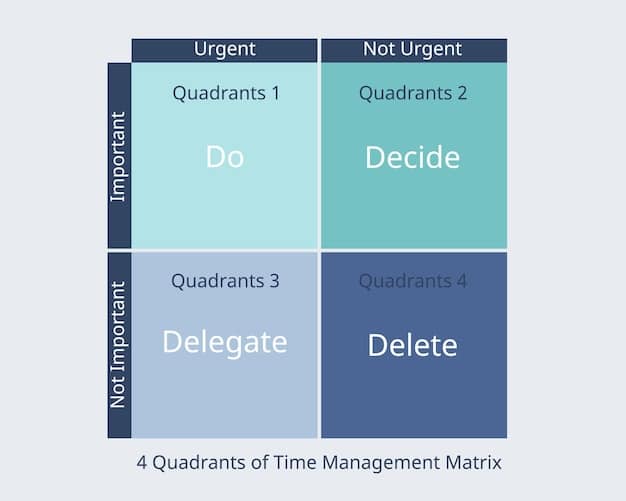Master Effective Study Habits: Time Management and Note-Taking Strategies

Developing effective study habits involves mastering time management and implementing strategic note-taking to enhance comprehension, retention, and overall academic performance.
Unlocking your academic potential starts with developing effective study habits. This article explores essential time management and strategic note-taking strategies to transform your learning experience.
How to Develop Effective Study Habits: Time Management Fundamentals
Effective study habits are the cornerstone of academic success, providing a structured approach to learning and knowledge retention. Central to these habits is the ability to manage time efficiently. Understanding and implementing effective time management techniques can significantly enhance your study sessions.
Time management isn’t just about fitting more into your day; it’s about making the most of the time you have. By prioritizing tasks, setting realistic goals, and creating a schedule, you can transform your study habits and reduce stress.
Prioritizing Tasks with Eisenhower Matrix
The Eisenhower Matrix is a powerful tool for prioritizing tasks based on their urgency and importance. This method allows you to focus on what truly matters, preventing you from getting bogged down by less critical activities.
Setting Realistic Goals
Setting achievable goals is crucial for effective time management. Start by defining specific, measurable, attainable, relevant, and time-bound (SMART) goals to keep you on track and motivated.
- Specific: Define your goals clearly. Instead of saying “study more,” say “review chapter 1 by Friday.”
- Measurable: Quantify your goals. For example, “complete 20 practice problems per study session.”
- Attainable: Ensure goals are realistic and within your reach. Ambitious, but doable.
- Relevant: Align your goals with your overall academic objectives. Ensure they contribute to your course success.

Implementing these time management fundamentals will help you structure your study sessions effectively, ensuring you make the most of your time and achieve your academic goals.
Creating a Study Schedule: A Step-by-Step Guide
Creating a structured study schedule is essential for maintaining consistency and achieving academic success. This involves several key steps, from assessing your current commitments to allocating specific time slots for studying, ensuring a balanced and effective routine.
A well-designed study schedule helps you stay organized, reduce procrastination, and build effective routines. It’s about allocating time for each subject, factoring in breaks, and adjusting the schedule as needed to accommodate unforeseen events or changing priorities.
Step 1: Assess Your Current Commitments
Begin by listing all your current commitments, including classes, work, extracurricular activities, and personal obligations. This provides a clear picture of how your time is currently spent.
Step 2: Allocate Time for Each Subject
Allocate specific time slots for each subject based on its difficulty and your proficiency. Prioritize subjects that you find challenging or require more attention.
- Block Scheduling: Dedicate large blocks of time to a single subject to promote deep learning.
- Timeboxing: Allocate a fixed amount of time for a specific task, such as 30 minutes for reading an article.
- The Pomodoro Technique: Work in focused 25-minute intervals followed by a 5-minute break to maintain concentration.
By following these steps, you can create a study schedule that aligns with your individual needs and promotes effective learning.
Mastering Note-Taking: Key Strategies for Academic Success
Effective note-taking is a critical skill for academic success, allowing you to capture essential information from lectures and readings in a structured and meaningful way. Different note-taking methods cater to various learning styles and preferences.
Note-taking is more than just transcribing what you hear or read. It’s about actively engaging with the material, summarizing key points, and organizing information in a way that makes sense to you. Mastering note-taking can significantly enhance your understanding and retention.
The Cornell Method
The Cornell Method divides your note paper into three sections: notes, cues, and summary. This systematic approach promotes active listening and review.
The Outlining Method
The outlining method uses headings, subheadings, and bullet points to organize information hierarchically. This method is excellent for capturing the structure of a lecture or reading.
Experiment with different note-taking methods to find the one that best suits your learning style and the nature of the material. Effective notes not only capture information but also facilitate future review and understanding.
Improving Memory and Retention: Techniques for Effective Studying
Improving memory and retention is crucial for academic success, enabling you to recall information effectively during exams and apply knowledge to real-world situations. Several techniques can significantly enhance your ability to retain information.
Memory and retention are not just about memorizing facts; they are about understanding and connecting information in meaningful ways. Implementing effective memory techniques can transform your study habits and improve your learning outcomes.
Spaced Repetition
Spaced repetition involves reviewing material at increasing intervals over time. This method reinforces learning and strengthens memory.
Active Recall
Active recall is the process of retrieving information from memory without looking at your notes. This technique strengthens neural pathways and improves retention.
- Flashcards: Use flashcards to test your knowledge of key concepts and definitions.
- Self-Quizzing: Create practice questions and test yourself regularly to reinforce learning.
- Teach Others: Explaining concepts to others helps solidify your understanding and identify areas where you need more review.

By incorporating these memory and retention techniques into your study routine, you can enhance your learning process and achieve better academic results.
Overcoming Procrastination and Staying Focused While Studying
Overcoming procrastination and maintaining focus are essential for effective study habits. Procrastination can derail your study schedule and lead to unnecessary stress, while a lack of focus can make study sessions unproductive.
By identifying the reasons behind your procrastination and implementing strategies to stay focused, you can create a study environment that promotes productivity and reduces distractions.
Identify the Reasons Behind Procrastination
Understanding why you procrastinate is the first step in overcoming this habit. Common reasons include fear of failure, perfectionism, and lack of motivation.
Create a Study Environment That Promotes Focus
Your study environment can significantly impact your ability to concentrate. Choose a quiet, well-lit space free from distractions.
- Minimize Distractions: Turn off social media notifications and other distracting apps.
- Use Noise-Cancelling Headphones: Block out background noise to improve concentration.
- Set Clear Goals: Define what you want to achieve during each study session to stay on track.
By addressing the root causes of procrastination and creating a focus-friendly environment, you can significantly improve your study habits and achieve better academic outcomes.
Balancing Study, Rest, and Extracurricular Activities for a Healthy Lifestyle
Balancing study, rest, and extracurricular activities is vital for maintaining a healthy and sustainable lifestyle. Neglecting any of these aspects can lead to burnout, reduced academic performance, and overall dissatisfaction.
A balanced lifestyle not only enhances your well-being but also improves your ability to focus and learn effectively. Prioritizing self-care and managing your time wisely can help you achieve academic success without sacrificing your health or personal life.
Prioritize Rest and Exercise
Adequate rest and regular exercise are crucial for physical and mental health. Make sure to get enough sleep and incorporate physical activity into your daily routine.
Engage in Extracurricular Activities
Participating in extracurricular activities provides opportunities for social interaction, personal growth, and stress relief. Choose activities that you enjoy and that align with your interests.
Balancing study, rest, and extracurricular activities is essential for a fulfilling and successful academic journey. By prioritizing self-care and managing your time effectively, you can achieve your goals without sacrificing your well-being.
Reviewing and Adjusting Study Habits for Continuous Improvement
Reviewing and adjusting your study habits is crucial for continuous improvement. What works well at one point may need adjustment later as your courses, workload, or personal circumstances change. Regularly assessing your study strategies ensures they remain effective and aligned with your goals.
Adaptability is key to effective learning. By consistently evaluating your study methods and making necessary changes, you can optimize your learning process and achieve ongoing academic success.
Regularly Assess Your Study Strategies
Take time to reflect on your study habits and assess their effectiveness. Are you achieving your goals? Are you retaining information? Are you managing your time efficiently?
Seek Feedback from Instructors and Peers
Feedback from instructors and peers can provide valuable insights into your study habits. Ask for suggestions on how to improve your learning strategies.
| Key Point | Brief Description |
|---|---|
| ⏰ Time Management | Prioritize tasks and create a schedule for effective study sessions. |
| 📝 Note-Taking | Employ methods like Cornell or Outlining to capture essential information. |
| 🧠 Memory & Retention | Use spaced repetition and active recall to strengthen memory. |
| 🧘 Balanced Lifestyle | Balance study with rest and extracurriculars for a healthy lifestyle. |
What are some effective time management strategies for studying?
Effective time management strategies include creating a study schedule, prioritizing tasks using the Eisenhower Matrix, and setting realistic goals with the SMART framework to make the most of your study time.
How can the Cornell method improve my note-taking skills?
The Cornell method enhances note-taking by dividing your paper into notes, cues, and summary sections, promoting active listening and review for better comprehension and retention.
What are some techniques for improving memory and retention?
Techniques for improving memory and retention include spaced repetition, active recall using flashcards or self-quizzing, and teaching others to solidify your understanding of the material.
How can I overcome procrastination and stay focused while studying?
To overcome procrastination, identify the reasons behind it, create a distraction-free study environment, minimize interruptions, and set clear goals for each study session.
Why is balancing study, rest, and extracurricular activities important?
Balancing study, rest, and extracurricular activities is critical for a healthy lifestyle, preventing burnout and enhancing your ability to focus and learn effectively, while prioritizing personal growth and relaxation.
Conclusion
Developing effective study habits through time management and strategic note-taking is essential for academic success and personal well-being. By implementing the strategies discussed, you can transform your learning experience and achieve your academic goals.





